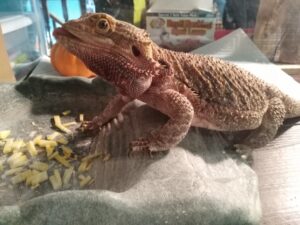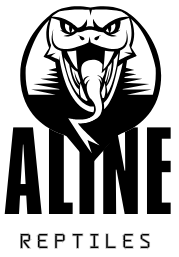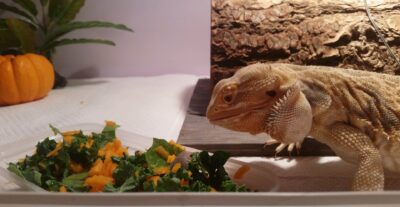If you’re a bearded dragon owner, you know how important a balanced and nutritious diet is for your reptile friend. But when it comes to vegetables, not all are safe for them to eat. This brings us to a common question: Can bearded dragons eat squash?
Bearded dragons can safely eat squash, and it can be a healthy addition to their diet when prepared properly. Squash provides essential nutrients, is easy to digest, and can add variety to their meals. However, it’s important to know which types of squash are best, how often to feed it, and how to prepare it correctly.
Nutritional Benefits of Squash for Bearded Dragons

Squash is a nutrient-rich vegetable that can benefit your bearded dragon in many ways. Here’s a breakdown of its key nutrients:
| Nutrient | Benefit for Bearded Dragons |
|---|---|
| Vitamin A | Supports eye health, immune function, and skin health |
| Vitamin C | Helps boost the immune system and overall health |
| Fiber | Aids in digestion and prevents constipation |
| Water | Keeps bearded dragons hydrated |
| Low Oxalates | Does not interfere with calcium absorption like some other veggies |
Since bearded dragons require a mix of vegetables, fruits, and proteins, squash can be an excellent staple vegetable to include in their diet.
Types of Squash Bearded Dragons Can Eat
Not all squash varieties are equal when it comes to nutrition. Here’s a breakdown of which types of squash are safe and beneficial for bearded dragons:
Safe Squash Varieties for Bearded Dragons
| Type of Squash | Nutritional Benefits | How Often to Feed |
| Butternut Squash | High in vitamin A, low in oxalates, good fiber content | 2-3 times per week |
| Zucchini (Summer Squash) | Hydrating, easy to digest, lower in nutrients | Occasionally |
| Acorn Squash | Rich in antioxidants, good for variety | Occasionally |
| Spaghetti Squash | Low in calories, moderate fiber | Occasionally |
These types of squash can be offered raw or lightly cooked, but should always be served chopped or grated to make it easier for bearded dragons to eat.
Avoid These Squash Varieties
Some types of squash are not ideal for bearded dragons due to their high sugar content or low nutritional value. Avoid feeding them canned, processed, or seasoned squash as well.
How to Prepare Squash for Your Bearded Dragon
Proper preparation ensures that your bearded dragon gets the most nutrition from squash. Follow these steps:
- Wash Thoroughly – Remove any dirt, pesticides, or chemicals.
- Peel the Skin – While some squash skins are safe, peeling makes digestion easier.
- Remove the Seeds – Seeds can be a choking hazard.
- Chop or Grate – Cut into small, bite-sized pieces or grate for easier eating.
- Serve Raw or Lightly Steamed – Raw is best for nutrients, but steaming can soften tough varieties.
- Mix with Other Veggies – Combine with leafy greens or other safe veggies for variety.
Pro Tip: Avoid adding any seasoning, salt, or oil when preparing squash for your dragon.
How Often Can Bearded Dragons Eat Squash?
Bearded dragons should eat a balanced diet consisting of vegetables, insects, and fruits. Here’s a recommended feeding frequency for squash:
| Age | Feeding Frequency |
| Baby Bearded Dragons (0-5 months) | 1-2 times per week, small portions |
| Juvenile Bearded Dragons (6-12 months) | 2-3 times per week |
| Adult Bearded Dragons (1 year+) | 2-3 times per week, moderate portions |
Squash should be part of a vegetable mix rather than a standalone food item. Always rotate with other veggies like collard greens, mustard greens, and bell peppers.
Potential Risks of Feeding Squash

While squash is a great vegetable for bearded dragons, there are some potential risks to keep in mind:
- Too Much Can Cause Nutrient Imbalance – Squash is high in vitamin A, and excessive amounts could lead to vitamin A toxicity.
- High in Sugar – Certain types of squash (like butternut) contain more sugar than leafy greens, which could contribute to obesity.
- Choking Hazard – If not chopped properly, squash pieces might be too large for a bearded dragon to chew.
To avoid these risks, always feed squash in moderation and ensure it is prepared correctly.
Can Baby Bearded Dragons Eat Squash?
Yes, but with some precautions:
- Feed in small amounts – Baby bearded dragons need more protein than veggies.
- Grate or finely chop – Their jaws are smaller, making large pieces harder to eat.
- Combine with insects – Mix squash with insect protein sources like crickets or mealworms for a balanced meal.
Tip: Avoid overfeeding squash to babies as they require more protein for growth.
Signs Your Bearded Dragon Likes or Dislikes Squash
Every bearded dragon has unique taste preferences! Here’s how to tell:
| Signs They Like Squash | Signs They Dislike Squash |
| Eagerly eats it | Ignores or spits it out |
| Healthy digestion, no issues | Shows discomfort or bloating |
| Active and alert | Refuses food after eating squash |
If your bearded dragon doesn’t like squash, try mixing it with other vegetables or offering it in a different texture (grated vs. chopped).
Other Safe Vegetables for Bearded Dragons

While squash is a good choice, it’s important to rotate vegetables for a balanced diet. Here are some other safe options:
| Vegetable | Benefits |
| Collard Greens | High in calcium, excellent staple green |
| Mustard Greens | Great source of fiber and vitamins |
| Bell Peppers | Adds variety, contains vitamin C |
| Carrots | High in beta-carotene, good for variety |
| Dandelion Greens | Rich in calcium, helps with digestion |
Conclusion
Squash is a nutritious, hydrating, and safe vegetable for bearded dragons when fed in moderation. It provides essential vitamins, fiber, and hydration while adding variety to their diet. Just remember:
Feed 2-3 times per week for adult dragons. Choose safe varieties like butternut, zucchini, and acorn squash. Prepare it properly by washing, peeling, and chopping it into small pieces. ✔ Mix it with other vegetables for a well-balanced diet.

